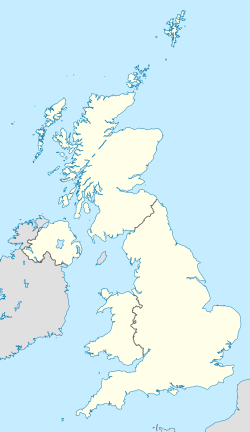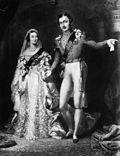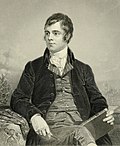
Back بوابة:المملكة المتحدة Arabic Portal:Böyük Britaniya Azerbaijani প্রবেশদ্বার:যুক্তরাজ্য Bengali/Bangla دەروازە:شانشینی یەکگرتوو CKB Portál:Spojené království Czech Portal:Vereinigtes Königreich German Portal:Qraliya Yewbiyayiye DIQ Portal:Reino Unido Spanish درگاه:بریتانیا Persian Portail:Royaume-Uni French
The United Kingdom Portal
 |
 |

| |
The United Kingdom of Great Britain and Northern Ireland, commonly known as the United Kingdom (UK) or Britain, is a country in Northwestern Europe, off the coast of the continental mainland. It comprises England, Scotland, Wales, and Northern Ireland. The UK includes the island of Great Britain, the north-eastern part of the island of Ireland, and most of the smaller islands within the British Isles, covering 94,354 square miles (244,376 km2). Northern Ireland shares a land border with the Republic of Ireland; otherwise, the United Kingdom is surrounded by the Atlantic Ocean, the North Sea, the English Channel, the Celtic Sea, and the Irish Sea. The UK maintains sovereignty over the British Overseas Territories, which are located across various oceans and seas globally. The United Kingdom had an estimated population of over 68.2 million people in 2023. The capital and largest city of both England and the United Kingdom is London. The cities of Edinburgh, Cardiff, and Belfast are the national capitals of Scotland, Wales, and Northern Ireland, respectively.
The UK has been inhabited continuously since the Neolithic. In AD 43, the Roman conquest of Britain began; the Roman departure was followed by Anglo-Saxon settlement. In 1066, the Normans conquered England. With the end of the Wars of the Roses, the English state stabilised and began to grow in power, resulting by the 16th century in the annexation of Wales, and the establishment of the British Empire. Over the course of the 17th century, the role of the British monarchy was reduced, particularly as a result of the English Civil War. In 1707, the Kingdom of England and the Kingdom of Scotland united under the Treaty of Union to create the Kingdom of Great Britain. In the Georgian era, the office of prime minister became established. The Acts of Union 1800 incorporated the Kingdom of Ireland to create the United Kingdom of Great Britain and Ireland in 1801. Most of Ireland seceded from the UK in 1922 as the Irish Free State, and the Royal and Parliamentary Titles Act 1927 created the present United Kingdom.
The UK became the first industrialised country and was the world's foremost power for the majority of the 19th and early 20th centuries, particularly during the Pax Britannica between 1815 and 1914. The British Empire was the leading economic power for most of the 19th century, a position supported by its agricultural prosperity, its role as a dominant trading nation, a massive industrial capacity, significant technological achievements, and the rise of 19th-century London as the world's principal financial centre. At its height in the 1920s, the British Empire encompassed almost a quarter of the world's landmass and population, and was the largest empire in history. However, its involvement in the First World War and the Second World War damaged Britain's economic power and a global wave of decolonisation led to the independence of most British colonies. (Full article...)
Featured article
"Paranoid Android" is a song by English alternative rock band Radiohead, featured on their 1997 third studio album OK Computer. The lyrics of the bleak but intentionally humorous song were written primarily by singer Thom Yorke, following an unpleasant experience in a Los Angeles bar. Six minutes long, and in four distinct sections, the track is significantly influenced by The Beatles' "Happiness Is a Warm Gun" and Queen's "Bohemian Rhapsody". "Paranoid Android" takes its name from Marvin the Paranoid Android of Douglas Adams' The Hitchhiker's Guide to the Galaxy series. When released as the lead single from OK Computer, "Paranoid Android" charted at number three on the UK Singles Chart. It was well received by music critics and highlighted in many reviews of OK Computer. The track has appeared regularly on lists of the best songs of all time, including Rolling Stone's 500 Greatest Songs of All Time. Its animated music video, directed by Magnus Carlsson, was placed on heavy rotation on MTV, although the network censored portions containing nudity. Since its release, the track has been covered by numerous artists working in a variety of musical genres. (Full article...)
Featured biography
Penda was a 7th-century King of Mercia, a kingdom in what is today the English Midlands. A pagan at a time when Christianity was taking hold in many of the Anglo-Saxon kingdoms, Penda participated in the defeat of the powerful Northumbrian king Edwin at the Battle of Hatfield Chase in 633; nine years later, he defeated and killed Edwin's eventual successor, Oswald, at the Battle of Maserfield. From this point he was probably the most powerful of the Anglo-Saxon rulers of the time; he defeated the East Angles, drove the king of Wessex into exile for three years, and continued to wage war against the Bernicians of Northumbria. Thirteen years after Maserfield, he suffered a crushing defeat at the Battle of the Winwaed in the course of a final campaign against the Bernicians and was killed. (Full article...)
General images -
Subportals
WikiProjects
Things you can do
- Visit the British Wikipedians' notice board.
- The noticeboard is the central forum for information and discussion on editing related to the United Kingdom.
- Comment at the British deletion sorting page.
- This page lists deletion discussions on topics relating to the United Kingdom.
Featured pictures
Did you know -

- ... that Ed Miliband retweeted "Chaos with Ed Miliband" with a clown emoji during the October 2022 United Kingdom government crisis?
- ... that Dublin property developer Harry Crosbie received an OBE from the British ambassador to Ireland, partly for entertaining Elizabeth II with his showbiz contacts?
- ... that New Zealand composer Maewa Kaihau sold her rights to the song "Now is the Hour" for £10, a decade before it became a hit in the United Kingdom and United States?
- ... that when Westminster City Council in London agreed to use "global majority" as a more inclusive term than BAME or "ethnic minority", a Conservative MP called it "deeply sinister"?
- ... that neighboring British Sierra Leone and Liberia disputed their border, and the British Empire seized the disputed territory in 1885?
- ... that when Sarah Jane Baker was released after 30 years, she was the United Kingdom's longest serving transgender prisoner?
In the news
- 9 April 2025 –
- Universal Destinations & Experiences formally announces that they have chosen a site near Kempston Hardwick in Bedfordshire, England, as the location for their Universal Studios United Kingdom resort. The theme park will officially open in 2031 and will provide up to 28,000 jobs, including 8,000 permanent jobs. It will be the largest theme park in the UK upon completion. (AP)
- 7 April 2025 –
- The first birth of a baby in the United Kingdom to a woman with a transplanted womb is announced. The baby girl, delivered at Queen Charlotte's and Chelsea Hospital in London to a 36-year-old woman, is reported to be healthy. (BBC News)
- 5 April 2025 – Tariffs in the second Trump administration, Executive orders in the second presidency of Donald Trump
- UK-based multinational car manufacturer Jaguar Land Rover suspends vehicle exports to the United States for a month to evaluate the impact of Trump's tariffs on the automotive industry. (Fox Business)
- 5 April 2025 – Israel–United Kingdom relations
- Israel blocks two British Labour Party MPs from entering the country. (Reuters)
- 3 April 2025 – Tariffs in the second Trump administration
- A 25% tariff on all automotive imports into the United States enters force. No exemptions are announced despite requests from several major trade partners, including Japan and the United Kingdom. (Reuters)
- 27 March 2025 –
- British environmental activist group Just Stop Oil announces they will end all civil resistance, direct action, and vandalism-related protests immediately and disband by April 26 after the British government announced it will halt the granting of new oil and gas permits. (DW) (Government of the United Kingdom)
Categories
Other UK-connected Wikipedias
Wikimedia
The following Wikimedia Foundation sister projects provide more on this subject:
-
Commons
Free media repository -
Wikibooks
Free textbooks and manuals -
Wikidata
Free knowledge base -
Wikinews
Free-content news -
Wikiquote
Collection of quotations -
Wikisource
Free-content library -
Wikiversity
Free learning tools -
Wikivoyage
Free travel guide -
Wiktionary
Dictionary and thesaurus





















































































































